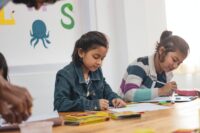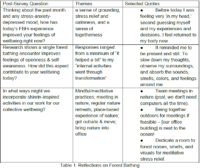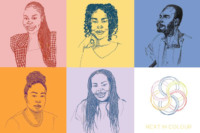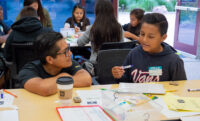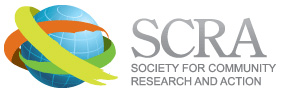Issues
Issues
Issues
We define community broadly and engage in communities of many kinds. Pieces are arranged topically and the list of issue topics is continually expanding.

Posted in: Children, Youth and FamiliesWithin general classrooms, stigma continues to harm the social-emotional health and academic ability of students with learning disabilities. There is strong empirical evidence to support that inclusive classrooms are more conducive to the social, behavioral, and academic success of students with LD.
Read MorePosted in: Environment, Mental HealthPublished in: The Community PsychologistA Forest Bathing mini-retreat can inspire us in at least two ways – gratitude and relationships. We can collectively express gratitude for the experience of forest bathing in the moment and for sharing time in-person with co-workers and friends who have scarcely been seen since the onset of the COVID-19 pandemic. Congregating safely in a […]
Read MorePosted in: Anti-Racism, Marginalized GroupsAlternative settings, like CBTL can provide relational healing spaces grounded in collectively held values of care, recognition, and reciprocity. CBTL exists within contexts of race and coloniality, but seeks to form solidarities, broader practices, and ways of relating within creative industries.
Read MorePosted in: Anti-Racism, Inspiration | Tags: Living Community PsychologyPublished in: The Community PsychologistDominique Thomas is an early career Community Psychologist, that brings to his work lived experience, both as a black person and raised within a lower-income family. Surrounded by a supportive village of nurturing teachers and a determined grandmother, and being named “gifted” early, he has been able to succeed academically. Nevertheless, his early disadvantages can […]
Read MorePosted in: Children, Youth and Families, Marginalized GroupsPublished in: Global Journal of Community Psychology PracticeLatinx high school students co-create and co-lead a course focused on identity and social action providing an example for others creating transformative educational opportunities for marginalized students.
Read MorePosted in: Aging, Marginalized GroupsPublished in: The Community PsychologistOlder individuals, already susceptible to isolation, are faced with social disparities stemming from loss of connection and social isolation during COVID-19. Here is how Conversaciones con los Abuelos helped.
Read MorePosted in: Education, Marginalized GroupsGeorgia State University graduate student Alesha Bond discusses the necessity of student organizing to push for change and the intersections of her research and organizing. Alesha shares some accomplishments, discusses the challenge of navigating power differentials, and provides advice to graduate student organizers.
Read MorePosted in: Anti-Racism, Mental HealthPublished in: American Journal of Community PsychologyWe can take an action-oriented approach to identify how cultural aspects of mental illness stigma manifest for racial and ethnic minority groups in the United States. Culturally salient interventions can promote change and empowerment at systemic and individual levels.
Read MorePosted in: Children, Youth and Families, Education, Marginalized GroupsPublished in: American Journal of Community PsychologyLatinX youth’s cultural experiences are related to the ways in which they experience afterschool program activities and interact with staff. To better support diverse youth and their math and STEM learning, serious and thoughtful consideration should be given to the promotion of culturally responsive practices.
Read MorePosted in: Coalition Building, Criminal Justice, Violence PreventionPublished in: American Journal of Community PsychologyWhile infrastructures can improve teams’ relationships and work, some are difficult to implement. SARTs could first focus on infrastructures that build trust and buy-in before adopting other accountability-focused infrastructures. Improving SART infrastructures can help promote SART collaboration and thereby improve survivors’ experiences.
Read More
